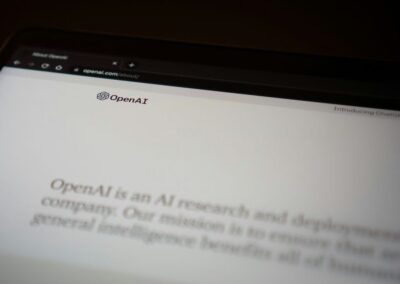Ambient Clinical Intelligence Is an Exciting Use Case for AI in Healthcare
Of all the AI innovations that are exploding into healthcare, this is one of the most exciting. Ambient clinical intelligence (ACI) is a process that uses advanced AI and voice recognition technology to automatically document patient encounters in real time, without the need for the clinician to type their note into the computer. The rapid advances in GPT have also made possible smart additions to the medical record such as lab reports, EKGs, and summaries of past visits.
Here’s why this is poised to make a big impact in healthcare for physicians and patients alike.
Clinical Documentation: A Common Source of Frustration
The history of clinical documentation has had a checkered record and has been a huge source of frustration for all professionals who see patients. It started with the handwritten note. As each physician saw the patient, a note was written on the paper record. The patient’s record or chart was put back on the rack and then passed on to the next examiner. I remember many times reviewing the chart and trying to decipher the handwriting of the various physicians who had previously seen that patient. As writing is also time-consuming, the physicians many times would enter the minimal amount of content into the note so that they could move on to the next patient.
Then came transcription services. A physician could carry a handheld recorder and dictate the note. The tape would be dropped off at the end of the day, and by the next morning, a typed note would be given to the physician to review, sign and place into the record. Dictation saved time (and writer’s cramps), but still had the inconveniences of having to review the final notes. And until the dictation came back, there was no documentation in the chart. To cover this deficiency, especially in hospitalized patients, one would write a brief “cover note” until the dictation was available—double duty.
Then came the medical scribe. A scribe is a medically trained professional who shadows the physician and manually writes or records the progress note in real time. This gave the physician the ability to spend more time with the patient. But scribes are labor-intensive and expensive, and many physicians could not afford to have one.
As the electronic health record became more sophisticated, the physician could type the note on a computer while in the room with the patient—a mixed blessing. As the physician was concentrating on writing the note, eye contact with the patient was minimized and many patients would question if the physician was even listening to them. Many physicians have told me over the years that they did not spend many years in highly specialized training just to be a typist! Still not a great solution.
One can easily see that over the years, clinical documentation has been a major dissatisfier for all medical personnel, and a significant contributor to provider burnout. Studies have shown that the average physician spends nearly 6 hours per day on the computer doing such documentation, much of this time after typical work hours.
Enter Ambient Clinical Intelligence
Ambient clinical intelligence is the merger of GPT, voice recognition, and the medical record. Imagine the following scenario:
The physician enters the patient’s room with a peripheral device such as a cell phone. After obtaining permission from the patient, the physician starts the encounter and turns on the cell phone. The voice recognition technology rapidly distinguishes between the voice of the patient and the voice of the physician. The patient’s complaint and the physician’s responses and treatment recommendations are then organized by GPT. Within minutes after the encounter, a note is generated that the physician could review, update, and sign.
In addition to producing a note for the present visit, GPT further has the ability to peruse the medical records and extract and incorporate additional information such as previous studies or labs into the final note.
Finally, this technology would have the ability to generate the appropriate medical diagnostic and procedure codes and after physician review, route them to the billing department in real time. This could dramatically improve the accounting process and reduce A/R turnaround time.
Although there are bugs to be worked out, this technology is far from a pipe dream. A major EHR company that is pioneering this technology recently conducted a study. In thirty sites across the country, physician time on the computer was reduced by 5.5 hours/week by using this technology. Additionally, there was a 76% reduction in after-hours work reported by the participating physicians. Sixty percent of the physicians felt that the AI-generated note was of higher quality than notes they had historically created. Additionally, the responses were felt to be more empathic.
I have no doubt that the successful implementation of ambient clinical intelligence (ACI) will lead to increased meaningful contact by the physician with the patient, increased quality of the clinical documentation, and increased provider and patient satisfaction.
Emerging AI in Healthcare
We will see many benefits of artificial intelligence in healthcare in the next few years. Here is a tangible example of how AI can positively affect both the physician and the patient. Given the dramatic rise of physician dissatisfaction and burnout, it is a straightforward way to use emerging technology in a physician-friendly manner that not only helps the physician, but also leads to improved clinical outcomes.
Over the next few months, I will be talking about other examples of the AI partnership. I wish to be vendor-neutral and discuss the capabilities of the technology as opposed to specific products. It is up to the organization to strategize which AI initiatives should be undertaken, and which vendors would supply the most appropriate products.
As always, I value your feedback and comments. If you’re interested in bringing my presentation on AI in healthcare to your organization, please reach out to me.




